#Wix vs Webflow
Text
#Webflow vs Wix comparison#Webflow or Wix for business websites#Pros and cons of Webflow and Wix#Webflow vs Wix pricing comparison#Webflow vs Wix for blogging#Best website builder: Webflow vs Wix#Webflow vs Wix for designers#Webflow vs Wix for beginners#Web Development Company#website development company#Top Website Development Company#hire website developers#Custom Websites Development
0 notes
Text

Tried Carrd.co for a portfolio site:
PROS:
Flexibility, options
Content types (I need captions, video, embedding, etc. The $20/year tier has this — that's a fair price)
Relatively easy, sort of. (see cons)
CONS:
Shadier Terms of Use than ArtStation's now (see below)
→ Why I was looking for a substitute in the first place. It doesn't make sense to jump to worse ToS.
Back-end UX:
→ The way it handles pages as "Sections" using #Control — this will get ugly, FAST. Containers can't be nested.
→ Again compared to ArtStation's site builder, it's more of a pain. Not worth the trouble or resources: Nowadays people hardly visit personal sites. Even as an Art Director I vastly prefer templates when looking at portfolios — easy to use, functional.
While I was working on Carrd, it was suddenly booted offline for a "violation".
→ That's what prompted me to look closer at their Terms: I hadn't violated anything. Support responded fast, said it was a mistake and put it back. But just like when Tumblr randomly deleted my page, this doesn't give me confidence in the service.
Carrd's terms for user content:
I'm no stranger to contracts. Yes most of this is probably for advertising. Still, these are comparatively unclear and even overzealous:
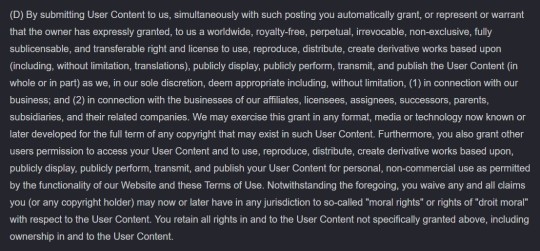
carrd.co/docs/general/terms → search: (D) By submitting User Content
"(D) By submitting User Content to us... you automatically grant, or represent or warrant that the owner has expressly granted, to us a worldwide, royalty-free, perpetual, irrevocable, non-exclusive, fully sublicensable, and transferable right and license to use, reproduce, distribute, create derivative works ... and publish the User Content (in whole or in part) as we, in our sole discretion, deem appropriate including, without limitation, ... We may exercise this grant in any format, media or technology now known or later developed ...
Compare to Tumblr and even ArtStation:
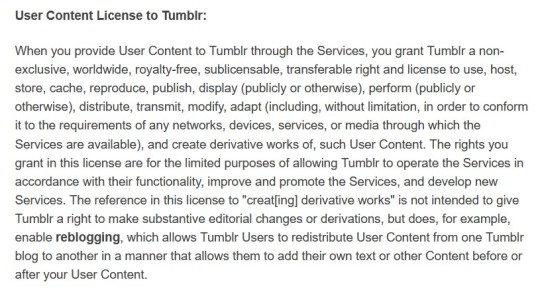
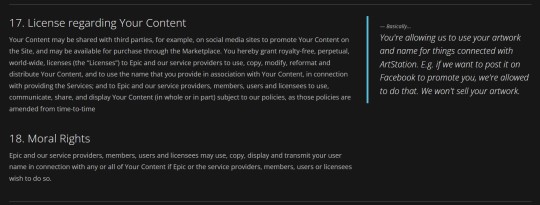
tumblr.com/policy/en/terms-of-service → search: User Content License to Tumblr
artstation.com/tos → search: 17. License regarding Your Content
—
Other options?
Criteria (see also: Pros and Cons above)
Free / cheap.
→ Carrd's Pro is $20/year. ArtStation was ~$80/year for me.
→ Not interested in predatory & expensive monthly subs.
Easy, simple, functional site-builder with templates.
→ I can build my own, but these days I'm not looking for web/visual design work. No need to spend the time.
Flexibility & options; various content types (images, long captions with links, video, embed code).
Good ToS, no AI, no NFT promotion, etc.
Standalone, not a social platform,
→ E.g.: https://natureintheory.artstation.com/ (yes) vs https://www.artstation.com/natureintheory (no)
→ NOT talking about hosting (owning your URL).
Usable now / within the year.
So,
NO:
Squarespace, Wix, Webflow, etc.
→ Expensive, and still limiting despite.
Build-your-own
→ Not worth the effort for multiple reasons described above.
Adobe/Behance
→ Support AI, NFTs & generally extortionate subscriptions.
Dribbble
→ Login lock makes it annoying for Art Directors (me) to access; image quality was terrible when I tried it for my own work.
Tumblr
→ Mostly because it's so... temperamental. See above.
Wordpress.com
→ See update.
MAYBE:
Wordpress.org / free tier
→ Maybe a pain.
Semplice for Wordpress
→ $120 but perpetual. Maybe a pain.
Building using Notion?
→ Heard some people are doing this. Probably easier than other from-scratch options, but still. Too much pain.
Weebly
→ I could live with the Free tier branding & URL. Not sure if the content features are enough, though: video & embeds?
????
Inkblot
→ Looks promising but very new & scrappy. No standalone site-builder currently.
Cara.app
→ Same as above.
—
Briefly... spending resources (time, $) on this was not in my plans this year. There's a ton else to worry about, between freelance work and shitty life events. So I don't know. I'm going to keep using ArtStation until my sub expires and researching the options. Who knows what new problems (or solutions) we'll have in a few months?
#art#artists on tumblr#artstation#human artist#human artists#noAI#cara.app#cara#inkblot#tumblr#carrd#art portfolio
20 notes
·
View notes
Link
#comparisonofPrintfulvsPrintify#Printfulreview#PrintfulvsPrintify#PrintfulvsPrintifyfordropshipping#Printifyreview#PrintifyvsPrintful
1 note
·
View note
Text
What is web design? does web design require coding?

Web design is what creates the overall look and feel when you're using a website. it is the process of planning and building the layouts of your website.
Top 3 ways to web design without coding
Use WordPress CMS and modify a website theme
WordPress is one of the most well-known content management systems available on the web today. The WordPress platform itself is free to use, just sign up for an account and you can start using it today. However, you need to purchase hosting and a domain in order to turn it into a working website. WordPress offers some free templates but there are plenty available on third-party marketplaces to buy. You never want to use a template right out of the box, unless you don’t mind your website looking like everyone else’s. Instead, you’ll want to modify the design to match your client’s company branding and messaging.
Use a WYSIWYG editor
WYSIWYG stands for “what you see is what you get”. With a WYSIWYG editor, you can edit the content of your website and see how it appears in real time. WYSIWYGs have surged in popularity over the years as companies like Squarespace and Wix have dominated the field. The main difference between using a WordPress theme vs a Squarespace theme is you have a whole customer service team available to answer any questions you have as you set up your website.
Try Webflow
Webflow creates clean code for your websites. No bloated code like WordPress. Why is clean code important? It helps your site load faster. You have the power of HTML, CSS, and JavaScript at your fingertips in a visual canvas, without actually having to know how to code.
0 notes
Photo

This infographic shows you the comparison between 02 best and popular website builders. Apart from that here, you will also find a list of things that you need to have a look at before choosing one. Thus, further, if you want to get detailed information https://ecommerce.saastrac.com/wix-vs-webflow-software-comparison/
1 note
·
View note
Text
03 Best Website Builder Software You Can't Afford To Miss.
Webflow

Are you looking forward to starting an online business?
Or want to let people know about your skills through writing blogs?
Well, in any case, you have to build an online space for representing yourself or your organization.
This space of yours in the online world is called the Website.
Briefly, a website is the central location of all the web pages, text images, GIFs or any other multimedia files related to your brand.
If we move back to some decades, creating your website was like an elephant in the room, to which everyone knows but doesn't want to talk since they know how difficult it was to create a website.
Well, the time goes when you have to have immense knowledge of programming language to create even a simple template, or you ought to look for the pro developer if you want to design a website for your brand.
All thanks to the technology which has gifted the present of Best Website Builder Software to those sections of industry who were suffering from lack of coding language to build a website for them.
What Is Website Building Software?

Before going deep down the rabbit hole to introduce the best website builder let us understand what actually it is meant for.
A website builder is the set of programs or tools by using which you can construct a website in just a few minutes by using some drag and drop editor.
Yes, that's the magic about using this tool, you can create the entire website even if you don't know the P of programming.
Fortunately, the innovation of website building tools has made things thousands of times easier than before.
List Of The Best Tool To Build A Website.
Webflow
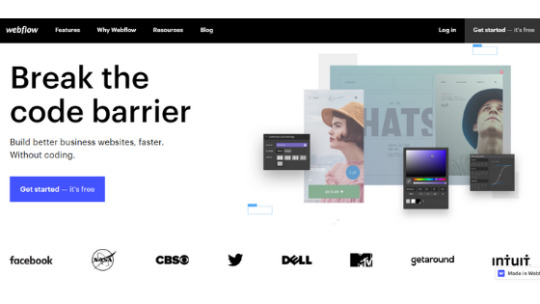
From the year it has been launched, Webflow is working outstandingly to help the businesses for developing their website. Basically, it is a software designed to develop a creative and workable website without troubling yourself with the enactment of code. Also,
With its photoshop like interface, a user can build semantic markup automatically by dragging and dropping HTML elements onto a canvas and styling CSS assets.
With an excellent user-friendly interface, Webflow allows you to create a customizable website very smoothly in a short time.
Webflow allows you to create dynamic content for your website without messing with the database or PHP.
Also read: Webflow review
Site 123
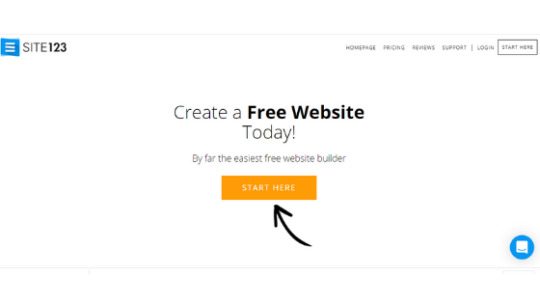
Free of cost and easy to customize Site 123 is one of the most effective website designing tool that helps businesses not only to craft an optimized website but also to set up an online store for themselves. Some of the principal characteristics of site 123 are:
Site 123 helps its users by providing a large variety of templet designs. By using which one can create a beautiful and creative website for themself.
With its mobile-friendly web interface, it assists its users to create a website that can work efficiently on mobile phones.
Site 123 also caters SEO tools along with website builders.
Also read: Site 123 review
Wix
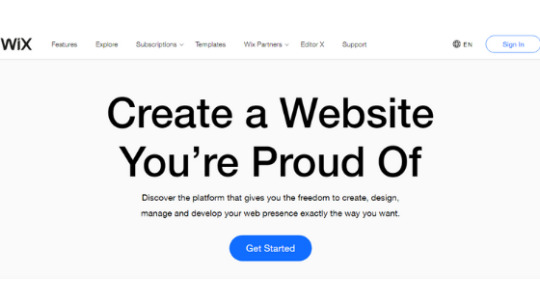
Wix is one of the easiest to use, reliable and well-established website builder in the market. With its versatility, Wix helps its users from creating a simple blog to an eye-catchy website. Here is the list of some principal features one can enjoy using Wix :
It has a big library of website templates, by which a builder can select the relatable templet according to their brand.
It is very simplistic to use with its endless customizing options.
It is quite cheap as compared to other website builders who provide the same level of features.
Whether it's an eCommerce platform, a music player or a food ordering website, you can design all these very smoothly.
Also read: Wix reviews
Also read Wix Vs. Webflow – Compare Tools. Save Bugs | Create Innovative Websites
Wrapping Words:
After reading the above article you can conclude that website builder is one of the most conventional decisions for all those businessmen who have tight hands in coding, resulting in hiring web developers paying a large amount of salary. Hence best Website Builder Software is one of the smart options for any businessmen or trader who wants to give their business an online presence without spending a lot of money and time.
#best website builder#website builder#Website Builder Software#website building tools#website creator
1 note
·
View note
Photo

Webflow vs WordPress: A Head-to-head Comparison

When an entrepreneur thinks about creating a new website, one option pops up right away: WordPress, the number one CMS in the world. With 38.4% of websites using WordPress, there’s no room to doubt its prominence. WordPress is to content management what Microsoft is to operating systems, Amazon to ecommerce, or Google to search.
However, in the last few years, a new contender has started to challenge WordPress’s throne: Webflow. While WordPress continues to lead in the blogosphere, Webflow has become the young prince of a new small but fast-growing kingdom known as the “the no-code movement”.
Inspired by millions of code-averse internet users, Webflow has grown rapidly to the point where some industry insiders started to question WordPress’s future as the primary option for non-technical website owners.
Is Webflow truly a contender to WordPress’s throne? Or is it a temporary threat that will never hurt WordPress’ dominance? In this article, we’ll look at what makes each company popular and the main threats to their respective positions.
WordPress: The Standard of Websites
WordPress started as nothing more than a pet project for Matt Mullenweg and Mike Little, two young developers who wanted to create an open-source blogging platform after b2/cafelog, the platform they used, stopped updating its code.
From this innocent beginning, WordPress grew to the point where today, companies as diverse as Zoom, The Walt Disney Company, and Zillow use it daily to power their blogging efforts. Media giants like Vogue, Techcrunch, and Rolling Stone see WordPress as much more than a CMS, but as the core of their entire online operations. Thanks to WordPress’ popularity, it’s safe to say that without it, much of the Web as we know it today wouldn’t work as it does.
But if you look beyond the big brand names and overwhelming statistics, WordPress continues to be nothing more than a glorified blogging platform. Up to this day, WordPress’ CMS capabilities are the reason that justifies its high adoption. Creating a website with WordPress has become the industry standard. Read any guide on starting a website, and you’ll see the same steps repeated over and over:
get a cheap blog hosting provider
install WordPress in one click
install a WordPress theme
customize it
add content
launch your website
As a non-technical person, I remember when I created my first website around 2010. It was daunting, even a bit scary. Not having a one-click WordPress installation didn’t help. But after I followed each of the steps my hosting provider shared, I got my first WordPress-powered website up and running. To me, that was the beginning of a long-lasting relationship with WordPress — one that I continue to keep up until today.
That’s not to say that installing and using WordPress for non-technical people like myself is easy. Working so closely with PHP feels like cleaning the engines of a submarine while immersed deep underwater; you think that if you touch the wrong screw, the whole ship can sink.
Automattic, the company behind WordPress, understands these fears very well, which is why it has developed a massive community of experts and hobbyists that steer non-technical people like myself in the right direction whenever they run into any issues. This tight-knit community is one reason why, despite its technical nature, WordPress continues to stay popular among non-technical people.
If we look beyond the brand names and overwhelming statistics, WordPress’s functionality is quite limited. It was created as a blogging platform, and it continues to be so. But this hasn’t stopped it from allowing others to develop unique ad-hoc functions whenever they need them.
With over 57,000 plugins, developers have transformed WordPress from a mere blogging platform into a versatile one capable of fulfilling almost every website owner’s needs. For example, if you need a contact form, you can install a free plugin like WPForms in a few clicks. There’s no need to open the engine and code a form with HTML and PHP.
I asked Jeremy Moser, the CEO of uSERP and the owner of a SaaS tool built for WordPress, why he thinks WordPress has become so successful, and he said:
WordPress is to websites as Apple is to phones. They succeed because of a few basic reasons. 1) Market share. They dominate the current market, and word of mouth sustains it. 2) They are plug and play! You can fire up a simple WordPress site in an hour, download 10 free plugins, and have your site optimized for conversions and more. The learning curve is almost non-existent for most functionality, providing an incredibly low barrier to entry.
WordPress’s limitations become apparent when you need in-depth custom changes, either on the front or the back end. Changing a theme’s aesthetics or adding unique functionality that no existing plugin offers requires hiring developers — people whose high-value services come at a high price.
Matt Medeiros, a WordPress entrepreneur and industry expert, has observed that WordPress has stopped being the best option for entrepreneurs due to the technical hurdles setting up a WordPress-based website.
There’s a fast and furious debate going on about WordPress’ up-and-coming REST API, and whether or not it’s making it to core anytime soon.
These discussions are for the 1% of the 1%, but they send ripple effects through the future timeline of our beloved software. In fact, I’d argue this is the most defining discussion to come along in a while, which will shape what WordPress is for the next decade. If you’re someone that doesn’t live and breathe WordPress like I do, why do you care? You probably don’t and quite frankly, why take on this cognitive load?
As you’ll see, the disconnection between WordPress and its non-technical community is one of the reasons that explain Webflow’s rise.
Besides the mental stress of managing a WordPress site, serious vulnerability issues have also changed WordPress’s public perception. One study found that at least 30,823 out of 42,106 WordPress websites analyzed had security vulnerabilities that put them at hackers’ mercy. Considering the costs of a data breach, the effort of keeping up with WordPress security challenges may not be worth it.
For almost 15 years, WordPress has seen cut-throat competition from Drupal and Joomla in the CMS field to Squarespace and Wix in the page builder industry to the traditional HTML template websites found in ThemeForest. Yet none of these competitors have been able to stop WordPress from becoming the primary option for website owners and developers — until Webflow showed up.
Continue reading Webflow vs WordPress: A Head-to-head Comparison on SitePoint.
by Ivan Kreimer via SitePoint https://ift.tt/2GlzEYg
0 notes
Text
Wix vs Webflow- Website Creation
I have previous experience in building websites from a paper I am taking this semester so I made it my responsibility to build the website for this project as well.
I am choosing between Wix and Webflow as the platform to build the website from. Webflow is fairly new to me but it is the site that we are using for my assignment in my Web Media class. By doing the studio website in Webflow, it would help me become more familiar with its features. However, it is more complex as it is a lot more customisable and made based on html and css codes so it would take longer for me to build a website with it. Wix on the other hand is less customisable as it is mostly just drag and drop. Even someone who has never done any html or css coding before would be able to use it.
I decided to go with the latter as we don’t really have a lot of time left until the due date. The website is only just a working prototype still. If we were to turn this into a proper business venture, then I would consider doing re-building it in a better way.
0 notes
Text
60% off #Website Builder Software Previews – $10
We look at Squarespace vs Weebly vs Wix vs Google Sites vs WordPress vs Webydo vs Webflow vs Sidengo vs LightCMS & More
Beginner Level, – 1 hour, 20 lectures
Average rating 4.2/5 (4.2 (5 ratings) Instead of using a simple lifetime average, Udemy calculates a course’s star rating by considering a number of different factors such as the number of ratings, the age of ratings, and the likelihood of fraudulent ratings.)
Course requirements:
A basic knowledge of SaaS software & general website-building terms will be helpful
Course description:
Every website is different and businesses have varied needs in terms of website builder SaaS software. You don’t want to be restricted by limited features, poor design, high per-user costs or software that takes hours of pouring through website help pages to learn.
The process for evaluating website builder software in the past was:
Do a Google Search for top website builder software, ask business colleagues for advice, check out reviews etc to find software to test
Sign up to 10 different website builder software programs, getting several drip campaign emails from each and paying upfront for some (thankful that most have a free trial)
Test, test, test. Reducing the list based on that one feature that many don’t have (and that you can’t see on their roadmap).
Show the software to other staff (if you’re working in a team)
Hope you (or they) like it.
—
I’ve created this course to make the process easier. Try this process:
Watch short videos that give you a window into the top-rated, established website building software systems. Companies that (we hope) won’t be bought out or closed down soon, leaving you searching again.
Choose one or two to test with your team (after showing them the video of the one you like)
Save hours of time and get a high-five from your inbox for not clogging it up with emails
I’ve tested out dozens of website builder software systems in my own design business, trying to find the one that was the perfect fit (a rare find). Let me save you the time and effort that it takes to get a good fit.
Take this quick, broad course to fast-track your search today, saving you $$$ and time where you could have been working.
—
Have I missed a topic you would like covered?
Have a question relating to the course?
Message me here on Udemy!
Please don’t forget to leave me a comment and a rating, every little bit of love helps

Full details
Know what major hosted website builder software systems are available
Have a good idea of the layout of each software system
Be able to access quickly the information they need to further evaluate the software for their business
Employees
Freelancers
Web Designers
Business Owners
Reviews:
“Excellent overview of all the basics, and combined with the builder comparison site, this is essential viewing for entrepreneurs wanting to get started today.
I’m a WordPress.org girl, but for people looking for easy to build, hosted sites this is a great resource.” (Cath Macadam)
“Gave me some basic understanding of different website builders.” (Khudabux Rao)
“” ()
About Instructor:
Rich Peterson
Rich Peterson is the founder of Generous Work, where he helps people create meaningful, profitable and highly useful businesses through innovation & design.
He is passionate about entrepreneurship, innovation, marketplaces, collaborative consumption, design that works and, of course, his family. When he’s not consulting, teaching, selling over $1.7 million dollars of books or lending money to people in third-world countries (through Kiva), you’ll find him reading, playing beach volleyball or mastering the art of surfing backwards.
Instructor Other Courses:
6 Methods For Streamlining Your Staff Hiring Process Rich Peterson, Udemy Teacher of 20k+ // Founder @ Generous (5) $10 $25
Build A Multi-Vendor Marketplace Using WordPress
Build Your Own Course Platform On Thinkific
……………………………………………………………
Rich Peterson coupons
Development course coupon
Udemy Development course coupon
Web Development course coupon
Udemy Web Development course coupon
Website Builder Software Previews
Website Builder Software Previews course coupon
Website Builder Software Previews coupon
coupons
The post 60% off #Website Builder Software Previews – $10 appeared first on Course Tag.
from Course Tag http://coursetag.com/udemy/coupon/60-off-website-builder-software-previews-10/
from Course Tag https://coursetagcom.tumblr.com/post/157265901548
0 notes
Text
Webflow vs Wix vs WordPress: Which is Better for Managing Many Client Websites at Once? https://t.co/WiMiUdADoX https://t.co/IrpLVf51z8
Webflow vs Wix vs WordPress: Which is Better for Managing Many Client Websites at Once? https://t.co/WiMiUdADoX https://t.co/IrpLVf51z8
— Tammi Channey (@thefrontrowking) June 12, 2020
from Twitter https://twitter.com/thefrontrowking
June 12, 2020 at 01:09PM
via Twitter
0 notes
Photo

In this Infographic, you will get to know about the difference between Wix and Webflow website builders. For more information, visit: https://ecommerce.saastrac.com/wix-vs-webflow-software-comparison/
0 notes
Text
WordPress vs WebFlow vs SquareSpace vs Wix
I was in conversation with a business owner about websites. He was asking my opinion on various website platforms, CMS’s etc. as he had a number of sites produced using them in recent years had websites using WordPress, SquareSpace, WebFlow and Wix.
I think SquareSpace produces some very nice websites, and does not require a lot of technical knowledge. While it has really nice templates, i do find it is quite limiting in what you can do, and better for sites which do not change that much. It does get quite pricey rather than other platforms.
Wix is quite similar I think it is slightly easier to use, and lets you have a little bit more freedom. While you can start with a free plan to get going, it will incur a monthly price to have anything professional.
WebFlow my limited exposure to using it, i reckon it is less suitable to someone who is non-technical, which I think both WIx and SquareSpace are a bit easier. I did find it had many templates and features. Again the ongoing price to use it is a negative.
WordPress is the CMS i have most experience of, and while I think it has an initial cost, to get a site up, and developed, it is more customisable, and benefits from the open nature of it, with many plugins and themes available both free and premium.
I haven’t done anything use Weebly really so am unable to comment, perhaps in my next rant.
0 notes
Photo

Website Builder Software Previews We look at Squarespace vs Weebly vs Wix vs Google Sites vs Wordpress vs Webydo vs Webflow vs Sidengo vs LightCMS & More…
0 notes
Text
CTEC708 Index- Qeyboard
WEBSITE IS UP!
Devices Research
Wix vs Webflow- Website Creation
Target Audience: Schools
Laptop Lending Service
Colour Palette
Target Audience
Wireframes
Post-Crit
Statement_of_Intent_Final_Final!(?).doc
Ideas Pre-COVID19 :((
Boom! We’re prototype testing
Moodboard
Statement of Intent
Human Relationships
Group formation + Topics of Interest
Finding common interests
Skills Evaluation
0 notes